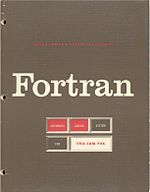FORTRAN II

The Fortran Automatic Coding System for the IBM 704 (15 October 1956), the first Programmer's Reference Manual for Fortran
|
|
| Paradigm | multi-paradigm: structured, imperative (procedural, object-oriented), generic |
|---|---|
| Designed by | John Backus |
| Developer | John Backus and IBM |
| First appeared | 1957 |
| Stable release |
Fortran 2008 (ISO/IEC 1539-1:2010) / 2010
|
| Typing discipline | strong, static, manifest |
| Filename extensions |
.f, .for, .f90, .f95, .f03, .f08, .f15
|
| Major implementations | |
| Absoft, Cray, GFortran, G95, IBM XL Fortran, Intel, Hitachi, Lahey/Fujitsu, Numerical Algorithms Group, Open Watcom, PathScale, PGI, Silverfrost, Oracle Solaris Studio, Visual Fortran, others | |
| Influenced by | |
| Speedcoding | |
| Influenced | |
| ALGOL 58, BASIC, C, Chapel,CMS-2, Julia, PL/I, PACT I, MUMPS and Ratfor | |
Fortran (formerly FORTRAN, derived from "Formula Translation") is a general-purpose, imperative programming language that is especially suited to numeric computation and scientific computing. Originally developed by IBM in the 1950s for scientific and engineering applications, Fortran came to dominate this area of programming early on and has been in continuous use for over half a century in computationally intensive areas such as numerical weather prediction, finite element analysis, computational fluid dynamics, computational physics, crystallography and computational chemistry. It is a popular language for high-performance computing and is used for programs that benchmark and rank the world's fastest supercomputers.
Fortran encompasses a lineage of versions, each of which evolved to add extensions to the language while usually retaining compatibility with prior versions. Successive versions have added support for structured programming and processing of character-based data (FORTRAN 77), array programming, modular programming and generic programming (Fortran 90), high performance Fortran (Fortran 95), object-oriented programming (Fortran 2003) and concurrent programming (Fortran 2008).
...
Wikipedia
